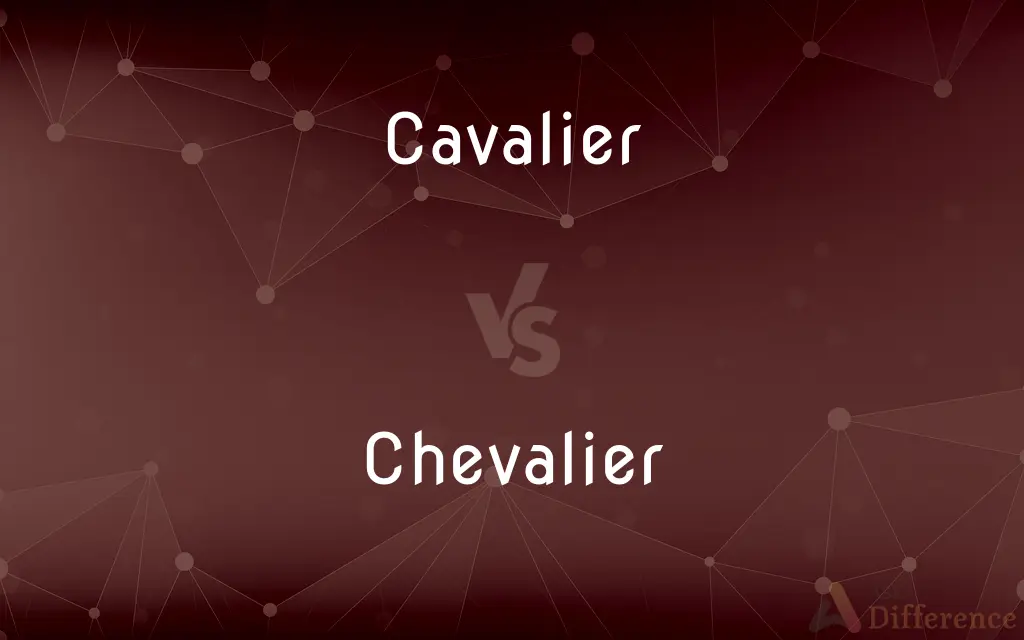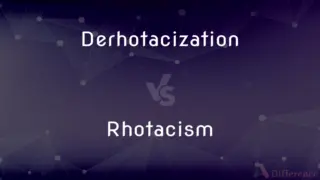Cavalier vs. Chevalier — What's the Difference?

Difference Between Cavalier and Chevalier
ADVERTISEMENT
Definitions
Cavalier
Cavalier () was first used by Roundheads as a term of abuse for the wealthier royalist supporters of King Charles I and his son Charles II of England during the English Civil War, the Interregnum, and the Restoration (1642 – c. 1679). It was later adopted by the Royalists themselves.
Chevalier
A knight.
Cavalier
A supporter of King Charles I in the English Civil War.
Chevalier
A member of certain male orders of knighthood or merit, such as the Legion of Honor in France.
Cavalier
A small spaniel of a breed with a long snout.
ADVERTISEMENT
Chevalier
A French nobleman of the lowest rank.
Cavalier
Showing a lack of proper concern; offhand
Anne was irritated by his cavalier attitude
Chevalier
Used as a title for such a nobleman.
Cavalier
A gallant or chivalrous man, especially one serving as escort to a woman of high social position; a gentleman.
Chevalier
A knight.
ADVERTISEMENT
Cavalier
A mounted soldier; a knight.
Chevalier
A chivalrous man.
Cavalier
Cavalier A supporter of Charles I of England in his struggles against Parliament. Also called Royalist.
Chevalier
(historical) A cavalier; a knight.
Cavalier
Showing arrogant or offhand disregard; dismissive
A cavalier attitude toward the suffering of others.
Chevalier
(card games) In tarot cards, the card between the valet and the dame.
Cavalier
Carefree and nonchalant; jaunty.
Chevalier
A horseman; a knight; a gallant young man.
Cavalier
Cavalier Of or relating to a group of 17th-century English poets associated with the court of Charles I.
Chevalier
A member of certain orders of knighthood.
Cavalier
Not caring enough about something important.
Chevalier
French actor and cabaret singer (1888-1972)
Cavalier
High-spirited.
Chevalier
A gallant or courtly gentleman
Cavalier
Supercilious.
Cavalier
(historical) Of or pertaining to the party of King Charles I of England (1600–1649).
Cavalier
A military man serving on horse, early modern cavalry officers who had abandoned the heavy armor of medieval knights.
Cavalier
A gallant: a sprightly young dashing military man.
Cavalier
A gentleman of the class of such officers, particularly:
Cavalier
A courtesan or noble under Charles I of England, particularly a royalist partisan during the English Civil War which ended his reign.
Cavalier
(slang) Someone with an uncircumcised penis.
Cavalier
A defensive work rising from a bastion, etc., and overlooking the surrounding area.
Cavalier
A Cavalier King Charles Spaniel, a small breed of spaniel of English origin with a silky, smooth coat and commonly a smooth undocked tail.
Cavalier
Of a man: to act in a gallant and dashing manner toward (women).
Cavalier
A military man serving on horseback; a knight.
Cavalier
A gay, sprightly, military man; hence, a gallant.
Cavalier
One of the court party in the time of king Charles I. as contrasted with a Roundhead or an adherent of Parliament.
Cavalier
A work of more than ordinary height, rising from the level ground of a bastion, etc., and overlooking surrounding parts.
Cavalier
Offhand; unceremonious; gay; easy; frank. Opposed to serious.
The plodding, persevering scupulous accuracy of the one, and the easy, cavalier, verbal fluency of the other, form a complete contrast.
Cavalier
High-spirited.
Cavalier
Supercilious; haughty; disdainful; curt; brusque.
Cavalier
Of or pertaining to the party of King Charles I.
Cavalier
A gallant or courtly gentleman
Cavalier
A royalist supporter of Charles I during the English Civil War
Cavalier
Given to haughty disregard of others

















































